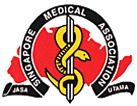
THESMANEWS
Present Issue
Past Issues
Journals
Present Issue
Past
Issues
Letters to the Editor

GRAND ROUNDS AND CASE CONFERENCES
Grand rounds and case conferences are important professional activities. We are reminded of their value in the teaching and sharing of clinical knowledge and skills in our study trip to Yangon. In the grand rounds, the whole retinue of staff going from bed to bed with the medical officer or house officer presenting the salient features, the consultant in charge discussing the physical signs and problems at hand, reminded the older doctors in our group of how knowledge and skills of clinical medicine are honed and handed down from seniors to juniors. The presence of the many senior staff makes the experience an enriching one, where one can tap on the wisdom across the breadth of the discipline and the process allows the filling of valleys of knowledge that have resulted from subspecialisation.
The hospital clinical conference too can be an enriching experience, especially if the organisers take the effort to present cases in a way that helps learning. The presentation of a series of cases that share a common disease is one such example. Thus, in Yangon, we were presented with a series of five hepatomas related to hepatitis B in varying ages ranging from a young girl to an elderly man. The presentation, physical signs and strategies of treatment were the substrate of discussion. Similarly, a series of rheumatic fever with manifestations from acute valvulitis to established valve stenosis and incompetence to rheumatic chorea from the paediatric ward was very educational. The presence of senior consultants, registrars, medical officers and students made the session lively and allowed for sharing of knowledge, experience and wisdom
In the Singapore setting, the effect of subspecialisation and privatisation
are bringing about amoeboid changes to the grand rounds and hospital conferences.
In some hospitals, rounds may downsize from grand to small that involve
only the doctors looking after the patients. The sharing of experience,
learning from the cases and one another vicariously as well as the informal
audit opportunities will be downsized accordingly. Hospital conferences
may be attended only by those in the subspecialties relevant to the special
areas being presented, so the benefit to those not in the subspecialty
is lost. Senior staff may feel it more important to
attend to the bottom line than to spend their time in the hospital round. This may explain their absence in hospital rounds in some hospitals.
We are in a transition. Some hospitals still have grand rounds and broad hospital conferences. We must not lose these activities. We must also encourage doctors, juniors and especially the seniors to attend for mutual sharing and learning. We must encourage our colleagues in general practice and specialist practice to attend, which means putting the sessions at a convenient time. How about breakfast meetings? The Americans are fond of breakfast meetings. Maybe that is the reason.